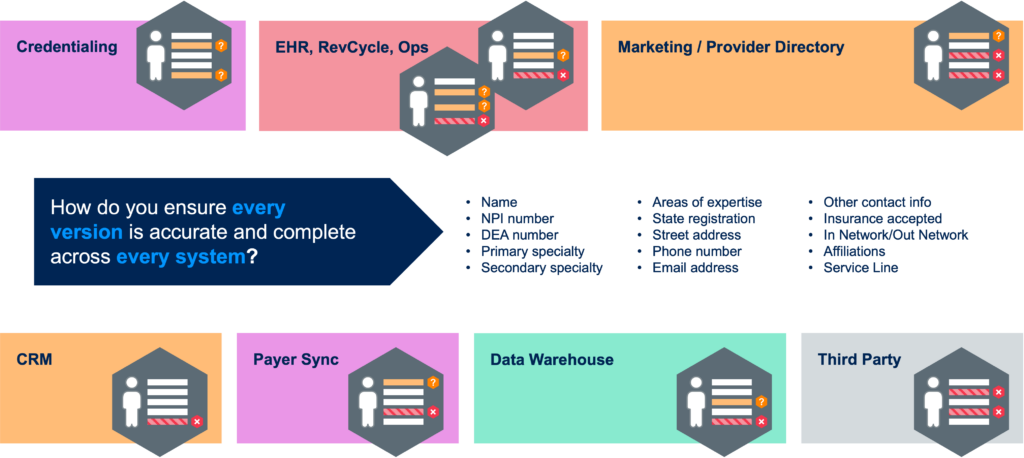Secret Attributes to Search For When Picking a Data Source Provider
Selecting a database supplier is a critical decision that can substantially impact your company's procedures and information monitoring approach. Amongst the crucial attributes to consider are scalability choices, which make certain that your system can adapt to growing demands.
Scalability Options
When selecting a data source provider, comprehending scalability choices is vital to ensuring that the selected remedy can fit future development. Scalability describes the ability of a database system to broaden its ability and performance in feedback to enhanced need. There are two primary sorts of scalability: horizontal and upright.
Upright scalability, or "scaling up," entails enhancing a single server's resources, such as CPU, RAM, or storage space. This technique can be economical and uncomplicated for smaller sized applications but might reach a limit where even more upgrades are impractical or too costly.
Horizontal scalability, or "scaling out," entails including extra servers to distribute the lots. This strategy allows for higher versatility and can fit substantial increases in data quantity and customer web traffic (database provider). It is specifically advantageous for cloud-based data source options that can dynamically designate resources based upon demand

Safety Actions

When evaluating safety and security procedures, take into consideration the implementation of security protocols (database provider). Data-at-rest and data-in-transit security are important to guarantee that sensitive info continues to be safeguarded, even in case of a safety and security breach. Furthermore, search for suppliers that provide solid authentication mechanisms, such as multi-factor verification (MFA), to even more boost access control
Routine safety audits and conformity with sector standards, such as GDPR or HIPAA, are indicative of a provider's commitment to information protection. In addition, ask about their occurrence reaction strategy; a durable strategy can minimize the impact of any kind of potential protection incident.
Performance Metrics
Assessing efficiency metrics is essential for companies to make certain that their selected data source company meets functional demands. Key performance metrics consist of feedback time, scalability, and throughput, which collectively identify the effectiveness of data source procedures under varying lots.
Feedback time is essential, as it mirrors just how swiftly the database can process inquiries and return results. Organizations should seek metrics that suggest typical reaction times throughout peak and off-peak hours. Throughput, usually determined in purchases per second (TPS), provides insight into the data source's capability to handle high quantities of requests without performance degradation.
Scalability examines the database's ability to expand with the company's requirements. A robust data source supplier should show upright and straight scaling abilities, permitting smooth modifications as demands rise and fall. Furthermore, recognizing latency, particularly in dispersed systems, can assist organizations assess the responsiveness of the database across various geographical areas.
Consumer Support
Reputable client assistance is a foundation of effective database administration, giving organizations with the aid required to optimize and settle problems efficiency. When choosing a database copyright, reviewing the degree of customer support they supply is essential. A durable assistance system ought to consist of several networks of interaction, such as phone, email, and live conversation, making certain that customers can access assistance whenever they require it.
Additionally, receptive support teams that are readily available 24/7 considerably improve the reliability of the database solution. Prompt reaction times and efficient resolution of problems can dramatically reduce downtime and increase general performance. It is additionally beneficial to take into consideration the availability of devoted assistance personnel, that can provide tailored support based upon an organization's particular demands.

Rates Framework
When explanation thinking about a database company, the prices structure is a pivotal aspect that can significantly impact a company's spending plan and overall method. A clear and flexible rates design is vital for lining up the database costs with service demands - database provider. Organizations must evaluate whether the rates is based on intake, per customer, or a level price, as each model can yield different financial implications over time
It is very important to evaluate any kind of added costs connected with the supplier's solutions, such as information storage space costs, transaction expenses, and support charges. Some companies might supply tiered prices, enabling my company scalability as the company expands, while others may enforce rigorous limits that might come to be costly as information requirements enhance.
Furthermore, organizations need to take into consideration the long-lasting value of the data source service. While lower preliminary rates can be attractive, they might not make up future upgrades, maintenance fees, or assimilation expenses. Conducting a thorough cost-benefit evaluation will certainly help recognize the most suitable pricing framework that balances scalability, support, and efficiency, ultimately making sure that the picked data source copyright straightens with the company's monetary and operational purposes.
Final Thought
In final thought, picking a database provider requires cautious factor to consider of different important attributes. Examining efficiency metrics makes it possible for the recognition of reliable databases, and obtainable consumer support enhances the general individual experience.
Picking a database service provider is a crucial decision that can substantially impact your organization's procedures and information administration approach.When selecting a database copyright, understanding scalability options is crucial to making certain that the chosen option can fit future development. When selecting a database provider, reviewing the degree of customer support they use is essential.When taking into consideration a database supplier, the pricing structure is a crucial aspect that can significantly affect a company's spending plan and general technique. Performing a detailed cost-benefit analysis will aid recognize the most suitable rates structure that stabilizes assistance, performance, and scalability, inevitably making sure that the chosen database service provider lines up with the company's monetary and operational objectives.